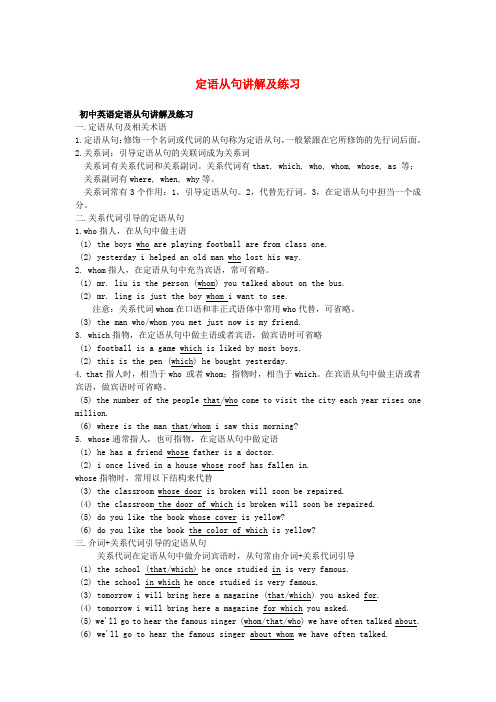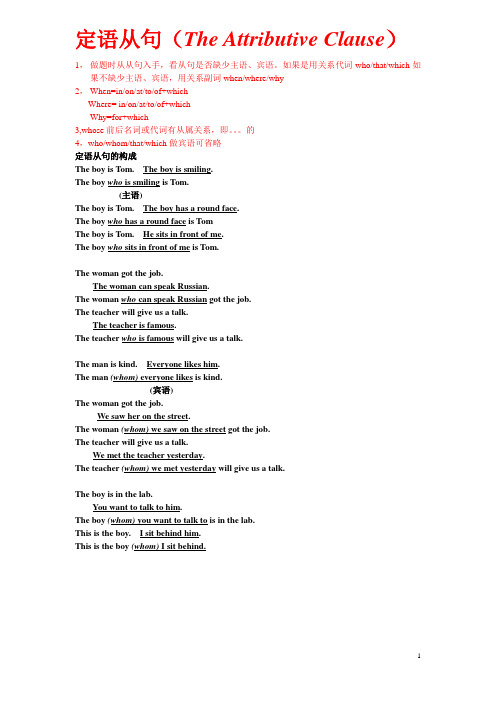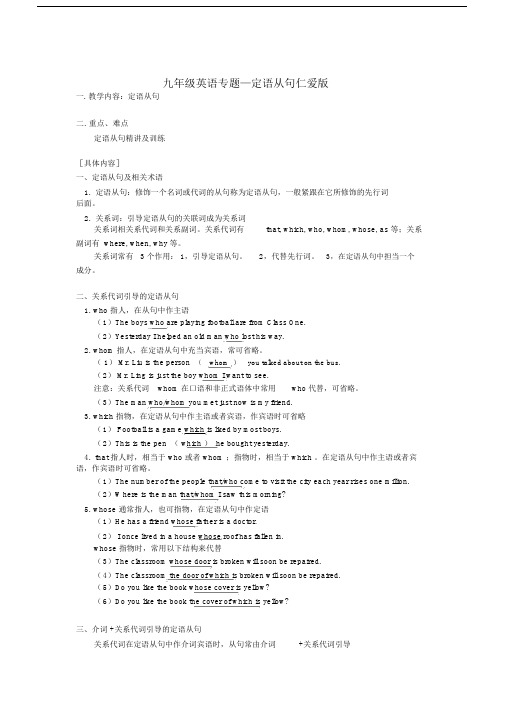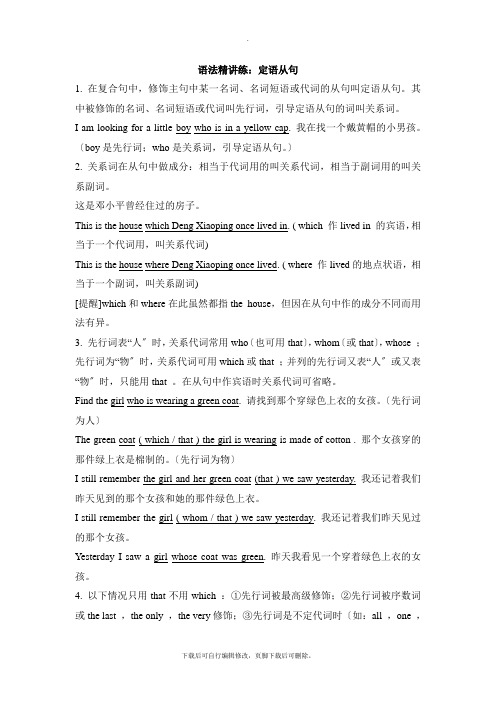仁爱定语从句讲解及练习仁爱.rar
- 格式:ppt
- 大小:3.58 MB
- 文档页数:17

定语从句讲解及练习初中英语定语从句讲解及练习一.定语从句及相关术语1.定语从句:修饰一个名词或代词的从句称为定语从句,一般紧跟在它所修饰的先行词后面。
2.关系词:引导定语从句的关联词成为关系词关系词有关系代词和关系副词。
关系代词有that, which, who, whom, whose, as 等;关系副词有where, when, why等。
关系词常有3个作用:1,引导定语从句。
2,代替先行词。
3,在定语从句中担当一个成分。
二.关系代词引导的定语从句1.who指人,在从句中做主语(1) the boys who are playing football are from class one.(2) yesterday i helped an old man who lost his way.2. whom指人,在定语从句中充当宾语,常可省略。
(1) mr. liu is the person (whom) you talked about on the bus.(2) mr. ling is just the boy whom i want to see.注意:关系代词whom在口语和非正式语体中常用who代替,可省略。
(3) the man who/whom you met just now is my friend.3. which指物,在定语从句中做主语或者宾语,做宾语时可省略(1) football is a game which is liked by most boys.(2) this is the pen (which) he bought yesterday.4. that指人时,相当于who 或者whom;指物时,相当于which。
在宾语从句中做主语或者宾语,做宾语时可省略。
(5) the number of the people that/who come to visit the city each year rises one million.(6) where is the man that/whom i saw this morning?5. whose通常指人,也可指物,在定语从句中做定语(1) he has a friend whose father is a doctor.(2) i once lived in a house whose roof has fallen in.whose指物时,常用以下结构来代替(3) the classroom whose door is broken will soon be repaired.(4) the classroom the door of which is broken will soon be repaired.(5) do you like the book whose cover is yellow?(6) do you like the book the color of which is yellow?三.介词+关系代词引导的定语从句关系代词在定语从句中做介词宾语时,从句常由介词+关系代词引导(1) the school (that/which) he once studied in is very famous.(2) the school in which he once studied is very famous.(3) tomorrow i will bring here a magazine (that/which) you asked for.(4) tomorrow i will bring here a magazine for which you asked.(5) we'll go to hear the famous singer (whom/that/who) we have often talked about.(6) we'll go to hear the famous singer about whom we have often talked.注意:1. 含有介词的动词短语一般不拆开使用,如:look for, look after, take care of 等(1) this is the watch which/that i am looking for. (t)(2) this is the watch for which i am looking. (f)2. 若介词放在关系代词前,关系代词指人时用whom,不可用who或者that;指物时用which,不能用that;关系代词是所有格时用whose(1) the man with whom you talked is my friend. (t)(2) the man who/that you talked with is my friend. (f)(3) the plane in which we flew to canada is very comfortable. (t)(4) the plane in that we flew in to canada is very comfortable. (f)3.“介词+关系代词”前可有some, any, none, both, all, neither, most, each, few 等代词或者数词(1) he loved his parents deeply, both of whom are very kind to him.(2) in the basket there are quite many apples, some of which have gone bad.(3) there are forty students in our class in all, most of whom are from big cities. 解答"介词+关系代词 "类型的定语从句题时,关键在于分析定语从句中的谓语动词(该动词是不及物动词)习惯上常与什么介词搭配使用。

定语从句(The Attributive Clause)1,做题时从从句入手,看从句是否缺少主语、宾语。
如果是用关系代词who/that/which如果不缺少主语、宾语,用关系副词when/where/why2,When=in/on/at/to/of+whichWhere= in/on/at/to/of+whichWhy=for+which3,whose前后名词或代词有从属关系,即。
的4,who/whom/that/which做宾语可省略定语从句的构成The boy is Tom. The boy is smiling.The boy who is smiling is Tom.(主语)The boy is Tom. The boy has a round face.The boy who has a round face is TomThe boy is Tom. He sits in front of me.The boy who sits in front of me is Tom.The woman got the job.The woman can speak Russian.The woman who can speak Russian got the job.The teacher will give us a talk.The teacher is famous.The teacher who is famous will give us a talk.The man is kind. Everyone likes him.The man (whom) everyone likes is kind.(宾语)The woman got the job.We saw her on the street.The woman (whom) we saw on the street got the job.The teacher will give us a talk.We met the teacher yesterday.The teacher (whom) we met yesterday will give us a talk.The boy is in the lab.You want to talk to him.The boy (whom) you want to talk to is in the lab.This is the boy. I sit behind him.This is the boy (whom) I sit behind.1. who指人,作主语或宾语(作宾语可省略)eg: 1) The man who visited our school yesterday is Mr Brown.2) The boy who we saw yesterday is Jack.3) He is the boy who I went to school with.4) The man who I talked with is our teacher5) A person who steals things is called a thief.2. whom指人,作宾语(作宾语可省略)1) The man whom you are going to visit is a famous writer.2) Have you met the person whom he was speaking about?3) The man (whom) I nodded to is Mr. Li.3. Whose : 指人或物,作定语,表示…的eg: 1) Harry is the boy whose mother is our Maths teacher.2) I saw some trees whose leaves were black.3) They helped the man whose car had broken.4) He lives in the house whose windows open to south.5) Please pass me the book whose cover is green.4. which 指物,作主语或宾语(作宾语可省略)eg: 1) These are the trees which were planted last year.2) This recorder (which)he is using is made in Japan.3) Is this the library (which) you borrow books from?5. that 指人/物,作主语或宾语(作宾语可省略)eg: 1) A plane is a machine that can fly.2) He is the man (that) I told you about.3) Let’s ask the man that is reading the book over there.4) The girl (that) we saw yesterday is Jim’s sister.5) The cakes (that) I cooked were delicious.考点一:介词的提前若引导词作介词的宾语,介词可以提前构成介词+引导词的形式Is this the library (which) you borrow books from?Is this the library from which you borrow books?The man (whom) I nodded to is Mr. Li.The man to whom I nodded is Mr. Li.注意这时引导词指人只能用whom,指物只能用which如果定语从句中的介词短语是固定搭配,则介词不能提前eg: 1) He is the man who I am looking for.2) He is the man who I am looking after.3) He is the man who I am looking at.Can you work them out????????Fill in the blanks with proper prepositions:1. The sun gives us heat and light, _without___ which we can’t live.2. The student _about___ whom we were talking just now is the best student in our class.3. I’ll never forget the day _on____ which she said good-bye to me.4. Who can give me the reason __for____ which he hasn’t turned up yet?Whose : 指人或物,作定语,表示…的eg: 1) Harry is the boy whose mother is our Maths teacher.2) I saw some trees whose leaves were black.3) They helped the man whose car had broken.4) He lives in the house whose windows open to south.5) Please pass me the book whose cover is green.that和which的区别以下情况,引导词用that,不用which。

九年级英语专题—定语从句仁爱版一. 教学内容:定语从句二.重点、难点定语从句精讲及训练[具体内容]一、定语从句及相关术语1.定语从句:修饰一个名词或代词的从句称为定语从句,一般紧跟在它所修饰的先行词后面。
2.关系词:引导定语从句的关联词成为关系词关系词相关系代词和关系副词。
关系代词有副词有 where, when, why 等。
关系词常有 3 个作用: 1,引导定语从句。
成分。
that, which, who, whom, whose, as 等;关系2,代替先行词。
3,在定语从句中担当一个二、关系代词引导的定语从句1.who 指人,在从句中作主语(1)The boys who are playing football are from Class One.(2)Yesterday I helped an old man who lost his way.2.whom 指人,在定语从句中充当宾语,常可省略。
( 1) Mr. Liu is the person(whom)you talked about on the bus.(2) Mr. Ling is just the boy whom I want to see.注意:关系代词whom 在口语和非正式语体中常用who 代替,可省略。
(3)The man who/whom you met just now is my friend.3.which 指物,在定语从句中作主语或者宾语,作宾语时可省略(1) Football is a game which is liked by most boys.(2)This is the pen ( which ) he bought yesterday.4.that 指人时,相当于 who 或者 whom ;指物时,相当于 which 。
在定语从句中作主语或者宾语,作宾语时可省略。
(1)The number of the people that/who come to visit the city each year rises one million.(2)Where is the man that/whom I saw this morning?5.whose 通常指人,也可指物,在定语从句中作定语(1)He has a friend whose father is a doctor.(2) I once lived in a house whose roof has fallen in.whose 指物时,常用以下结构来代替(3)The classroom whose door is broken will soon be repaired.(4)The classroom the door of which is broken will soon be repaired.(5)Do you like the book whose cover is yellow?(6)Do you like the book the cover of which is yellow?三、介词 +关系代词引导的定语从句关系代词在定语从句中作介词宾语时,从句常由介词+关系代词引导( 1)The school ( that/which ) he once studied in is very famous.(2)The school in which he once studied is very famous.( 3)Tomorrow I will bring here a magazine(that/which)you asked for.( 4)Tomorrow I will bring here a magazine for which you asked.( 5)We’ll go to hear the famous singer(whom/that/who)we have often talked about.(6)We’ll go to hear the famous singer about whom we have often talked.注意: 1. 含有介的短一般不拆开使用,如:look for, look after, take care of等( 1)This is the watch which/that I am looking for.(T)( 2)This is the watch for which I am looking.(F)2. 若介放在关系代前,关系代指人用whom ,不可用who 或者 that;指物用which ,不能用that;关系代是所有格用whose( 1)The man with whom you talked is my friend.(T)( 2)The man with who/that you talked is my friend.(F)( 3)The plane in which we flew to Canada is very comfortable.(T)( 4)The plane in that we flew in to Canada is very comfortable.(F)3.“介 +关系代”前可有 some, any, none, both, all, neither, most, each, few 等代或者数(1)He loved his parents deeply, both of whom are very kind to him.(2) In the basket there are quite many apples, some of which have gone bad.( 3)There are forty students in our class in all, most of whom are from big cities.四、关系副引的定从句1.when 指,在定从句中作状(1) I still remember the day when I first came to the school.(2)The time when we got together finally came.2.where 指地点,在定从句中作地点状(1)Shanghai is the city where I was born.(2)The house where I lived ten years ago has been pulled down. 拆坏(房子等)3.why 指原因,在定从句中作原因状(1)Please tell me the reason why you missed the plane.(2) I don ’tknow the reason why he looks unhappy today.注意:关系副引的从句能由“介+关系代”引的从句替( 1)The reason why/ for which he refused the invitation is not clear.( 2) From the year when/in which he was going to school he began to know what he wanted when he grew up.(3)Great changes have taken place in the city in which/where I was born.五、限制性定从句和非限制性定从句限制性定从句非限制性定从句形式上不用逗号和主句隔开用逗号和主句隔开意上是先行不可缺少的定,不能是先行的充明,除后意思除仍完整通常翻成主句的并列句法上翻成先行的定,“ ⋯ ⋯的⋯⋯”关系的 A 、做可省略B、可用 that A 、不可省B、不用 thatC、可用 who 代替 whom C、不用 who 代替 whom使用上限制性定从句例:(1)The teacher told me that Tom was the only person that I could depend on.(2)China is a country which has a long history.非限制性定从句例:(1)His mother, who loves him very much, is strict with him.(2)China, which was founded in 1949, is becoming more and more powerful.要注意区分以下几个句子的不同(1)His brother who is now a doctor always encourages him to go to college.他那当医生的哥哥常鼓励他要考上大学。

语法精讲练:定语从句1. 在复合句中,修饰主句中某一名词、名词短语或代词的从句叫定语从句。
其中被修饰的名词、名词短语或代词叫先行词,引导定语从句的词叫关系词。
I am looking for a little boy who is in a yellow cap. 我在找一个戴黄帽的小男孩。
〔boy是先行词;who是关系词,引导定语从句。
〕2. 关系词在从句中做成分:相当于代词用的叫关系代词,相当于副词用的叫关系副词。
这是邓小平曾经住过的房子。
This is the house which Deng Xiaoping once lived in. ( which 作lived in 的宾语,相当于一个代词用,叫关系代词)This is the house where Deng Xiaoping once lived. ( where 作lived的地点状语,相当于一个副词,叫关系副词)[提醒]which和where在此虽然都指the house,但因在从句中作的成分不同而用法有异。
3. 先行词表“人〞时,关系代词常用who〔也可用that〕,whom〔或that〕,whose ;先行词为“物〞时,关系代词可用which或that ;并列的先行词又表“人〞或又表“物〞时,只能用that 。
在从句中作宾语时关系代词可省略。
Find the girl who is wearing a green coat. 请找到那个穿绿色上衣的女孩。
〔先行词为人〕The green coat ( which / that ) the girl is wearing is made of cotton . 那个女孩穿的那件绿上衣是棉制的。
〔先行词为物〕I still remember the girl and her green coat (that ) we saw yesterday. 我还记着我们昨天见到的那个女孩和她的那件绿色上衣。


九年级仁爱英语专题训练:定语从句Class Name No. Mark一. 定语从句的功用和结构在复合句中,修饰某一名词或代词的从句叫做定语从句。
被定从句修饰的词叫做先行词。
定语从句必须放在先行词之后。
引导定语从句的关联词有关系代词和关系副词。
例如:This is the present that he gave me for my birthday.Do you know everybody who came to the party?I still remember the night when I first came to the village?This is the place where Chairman Mao once lived.二. 关系代词和关系副词的功用关系代词和关系副词用来引导定于从句,在先行词和定语从句之间起纽带作用,使二者联系起来。
关系代词和关系副词又在定语从句中充当一个成分。
关系待客做主语,宾语,定语,关系副词可作状语。
1. 作主语:关系代词在定语从句中作主语时,从句谓语动词的人称和数须和先行词一致。
例如:I don’t like people who talk much but do little.The cars which are produced in Hubei Province sell very well.2. 作宾语:She is the person that I met at the school gate yesterday.The book that my grandmother gave me is called “The Great Escape”.3. 作定语:关系代词whose在定语从句中作定语用。
例如:What’s the name of the young man whose sister is a doctor?The girl whose father is a teacher studies very hard. 4. 作状语I’ll never forget the day when I first came to Beijing. / This is thehouse where I was born.三. 各个关系代词和关系副词的具体用法1. who 指人,在定语从句中作主语。
一、选择题1.—Remember, ________ you do your homework, ________ mistakes you will make.—OK, Mom.A.the more careful; the less B.the more carefully; the less C.the more carefully; the fewer C解析:C【解析】【分析】【详解】句意:——记住,做作业越仔细,犯的错误就越少。
——好的,妈妈。
考查比较级的用法。
the +比较级…, the+比较级…表示“越……,就越……”。
分析句子,空1应用副词carefully修饰动词do,其比较级为more carefully,排除A。
less是little的比较级,修饰不可数名词;fewer是few的比较级,修饰可数名词复数;空2后面mistakes是名词复数,故用fewer修饰。
故选C。
2.—How often does he watch TV?—He watches TV.A.hard ever B.ever C.never C解析:C【解析】【详解】句意:——他多长时间看一次电视?——他从来不看电视。
考查频度副词。
hardly ever几乎从不,很少,没有hard ever这个词组,排除;ever (用于否定句和疑问句,或与if连用的句子)在任何时候,从来,曾经,本句没有否定词,也不是疑问句或if连用的句子,排除;never从不,绝不;故选C。
3.—Sarah always asks “Where’s my mother?”.—After all (毕竟), she is _______ three years old. She needs mother.A.then B.always C.only C解析:C【解析】【分析】【详解】句意:——莎拉总是问:“我妈妈在哪里?”——毕竟,她只有三岁。
一、选择题1.Little Tom draws __________. His pictures are very __________.A.good;well B.good;good C.well;good C解析:C【解析】【分析】【详解】句意:小汤姆画得很好。
他的画非常好。
考查形容词和副词。
A. good好的,形容词、well好地,副词;B. good好的,形容词、good好的,形容词;C. well好地,副词、good好的,形容词。
第一个空应用副词well修饰谓语draws,第二个空应用形容词good作is的表语,故选C。
2.My sister is too young to_______herself_______.A.look at;good B.look like;well C.look after;good D.look after;well D解析:D【解析】【详解】句意:我的妹妹太小了不能照顾好自己。
考查动词短语辨析及形容词、副词辨析。
look at看……;look like看起来像;look after照顾;good好的,形容词;well好,副词。
根据句意可知,这里表示“太小不能照顾自己”,用短语look after;第二个空修饰第一个空的动词短语,应用副词。
故选D。
3.My mother ________ at five o’clock.A.usually gets B.usually gets upC.gets up usually D.get usually up B解析:B【解析】【详解】句意:我的妈妈通常五点起床。
考查频度副词的位置。
根据选项中的usually可知,本句为一般现在时。
主语My mother是第三人称单数,谓语动词也要用第三人称单数,排除D项;get up意为“起床”,而A项中的gets不能单独作谓语,排除A项;usually是频度副词,要放在实义动词之前,排除C 项,故选B。